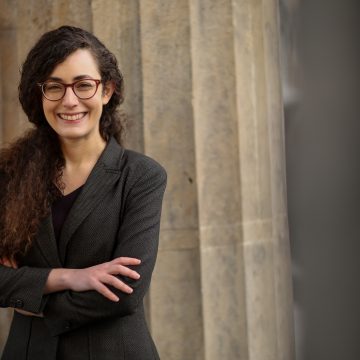PLAY
Oyf der vakh
[On Guard]Synopsis
A dining room in a mid-sized Russian city on a winter evening in 1903. Leyzer sits studying a Talmud volume and his wife Hinde is lost in thought. Leyzer asks Hinde angrily where their two daughters are. He does not approve of his elder daughter Tila’s modern ways, and blames Hinde for them. He wants to marry off his younger daughter Ester before she becomes rebellious like her sister, even though Hinde thinks she is still too young. Hinde observes that their daughters are not the only young people who are changing with the times. Leyzer leaves to go to the study house, telling his wife to be a mother, not realizing that she views her parental responsibilities differently. Her main goal as a mother is her children’s happiness. Ester returns home, and tries to warm up by dancing around the room. Hinde tells her that her father is displeased that she and her sister are never home, but Ester prefers the library with its many visitors and books by French authors. Hinde tells Ester that Faynshteyn is coming to discuss a match, and asks her what she thinks of him. Ester finds him attractive, and thinks he may offer a better alternative to the depressing environment at home, on the one hand, and the fearful, dour atmosphere of her sister’s politically radical circle, on the other. She prefers the romantic world of her books. Ester sweetly embraces her mother and points out the beauty of the view outside their window, such as the stars that glitter like the diamonds worn by Parisian women. She fantasizes about how Faynshteyn would take her out driving in his horse and wagon on nights such as this. Ester goes to her room to read, and Hinde wonders if she should tell her daughter that Faynshteyn only uses his horse and wagon to bring merchandise to the city, although she admits that perhaps even he would be more romantic than a serious, clever, enlightened man. Hinde sits thinking, and Tila enters. She asks her mother what she intends to do about Ester’s novel reading, which distracts her from the important issues of the day. Tila does not approve of the idea of her sister marrying Faynshtayn and becoming a “bourgeois madam.” She praises her “khosn” [fiancé] Max to her mother, even though she admits that she does not believe in the institution of marriage because she thinks long-term commitment is unrealistic. She gives her mother papers and tells her, if someone comes in the night, to burn them. Tila reassures her that she is not doing anything dangerous, she is simply going to Max’s. Hinde is distressed that her unmarried daughter is spending the night with a man, but she reminds herself that she should support her daughters’ youthful desires because her own were thwarted. Since Tila is curious about these dreams, she tells her about her love affair with Kasimir, a handsome local nobleman, who used to read novels to her in the garden behind his palace, among the apple trees. Although they swore their love to each other, Hinde succumbed to parental pressure to leave the village and later to marry Leyzer, even though she says she has not forgotten the love of her youth––when she sits lost in thought, she is reminiscing about him. Tila leaves before her father comes home, telling Hinde she is pursuing happiness for both of their sakes. When Leyzer enters, Hinde tells him both daughters are asleep, even though she knows both are still awake, one dreaming of happiness and the other one enjoying it.
A year and a half later, a summer morning in the same room. Hinde tidies the room, and Leyzer reads aloud from a newspaper report about a political demonstration. Both have noticeably aged: Tila disappeared over a year ago, and her parents have not even received a single letter. Yet Hinde reassures her husband that Ester is happy and radiant, and she believes strongly that Tila is alive and well. Leyzer is still concerned about Tila’s bad influence on Ester. Even though Ester is supposed to visit soon, her father leaves the house to take care of some business. Tila arrives, disguised as a peasant. She asks if Ester has turned into a fat bourgeois lady with a baby, but Hinde tells her the baby died and Ester is still as beautiful as ever, although now she reads her sister’s books. Hinde notices Tila’s thin, drawn appearance with some concern, and asks her if she is happy. Tila tells her mother that although she is in her early twenties, she feels like she is the elder of the two of them. While her mother’s memories of her unrequited love keep her soul young, Tila has left Max and has had two more lovers since then. Hinde begins crying, and Tila reassures her that she has had many enjoyable experiences too: she has traveled in cities and towns, built giant buildings, and her comrades would die for her. Today there will be a large general strike. Ester arrives, and tells Tila that now, for the first time, they are truly sisters because they share the same political activism. She has even left her husband, which shocks Tila, since she is no longer idealistic about the political movement. She says it turns young people old and cynical before their time. Hinde reports that the general strike has started. Leyzer returns, and his daughters kiss him, although he pushes them away and says that Cossacks have been summoned. In the background, a protest song can be heard. Ester and Tila feel they have no choice but to join their comrades. Hinde hysterically pulls Leyzer to the door, saying that they should die with their children, and collapses in Leyzer’s arms.
